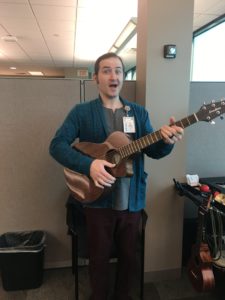Music therapy continues to gain acceptance in hospitals and other health care settings as a way for patients and families to cope with a stressful diagnosis. For children, music therapy can be a non-threatening modality that addresses their physical, emotional, cognitive, and social needs. This can be done through creating, singing, moving to, and/or listening to music. Music therapy also provides avenues for communication that can be helpful to those patients who may find it difficult to express themselves in words.
Children’s Nebraska of Omaha has started introducing music therapy to enhance the quality of life for children and their families during lengthy hospital stays.

Caleb Hastings joined Children’s Nebraska in 2020 as a music therapist working with patients in the hospital’s palliative care program.
“Music therapy within the palliative care program is much more patient-directed rather than prescriptive,” said Caleb. “My job is to be as creative as I can to improve their days based on their goals and do whatever it is that they’re looking for. Sometimes what that is for them is autonomy and control, sometimes it is processing difficult life events. I just want to be there for them to support them in that moment through music, whatever it is they are asking for.”
When kids are dealing with pain and stress, they only have so much bandwidth to process what is happening and can become easily overwhelmed. “When someone is focused on making music – something that requires motor skills, speech, and emotional engagement, that leaves a lot less space for the stuff that is worrisome or scary,” said Caleb.
“We know that music is cost-effective and side effect-free. It can aid in decreasing sedative needs and pain perception,” said Caleb. “Is music going to solve every problem of our life? No, but it could make it a lot easier and give our patients some measure of control, comfort, and relaxation.”
In his role, Caleb sometimes finds himself offering procedural support for patients. Patients who require frequent dressing changes, for example, benefit from him providing a modified environment with music. It may be as simple as being in the background playing a soothing tune to help the patient relax during a procedure. Or music therapy could be used in something much more active, such as telling a patient that when Caleb hits a particular note with his music, the bandage is coming off or, ideally, playing an instrument themselves.
And it’s not just the patients who benefit. When Caleb walks in, parents know it’s someone not giving them an update, explaining a procedure, or taking their child for another test.
“We’re presenting something non-threatening, that’s not heavy, and an activity that offers a respite,” said Caleb. “What’s best is when parents and other family members get into the music therapy as well. The whole family forgets they are in a hospital, even if just for a few precious minutes.”
Sometimes, Caleb’s patients are not in a place where they can actively participate in the music therapy. Some may, sadly, be nearing the end of their life. In these circumstances, Caleb makes recordings of the child’s heartbeat for the parents to give them a sense of peace and a way to feel close to their child.
“I will tell parents that the heartbeat is their child participating and saying ‘I love you,'” said Caleb. “It’s a one-of-a-kind message they can hold onto.” In many cases, families and patients choose music to be added to their child’s heartbeat, resulting in a unique musical legacy.
Before joining Children’s, Caleb was involved in the music therapy programs at Children’s Hospital of New Orleans and Cincinnati Children’s. Through those experiences, he saw how the program helped patients throughout all areas of the hospital and not just palliative care. He hopes to expand the program throughout Children’s, starting with hematology and oncology and eventually into neuro rehabilitation for children dealing with diseases, injury, or disorders of the nervous system.
“The sky is the limit when it comes to where we can take this program, and I look forward to seeing it grow, so all of our patients can experience music therapy,” said Caleb.
For now, Caleb will continue to deliver music therapy to patients and their families in the palliative care program, and, in doing so, hopes to bring a bit of joy and peace to their lives.
“I meet a lot of people on maybe one of the worst days of their lives, and so I’m just honored to be able to add something positive or to just be present,” he said. “I’m just so grateful to do that and spend time with these kids who are truly remarkable.”


